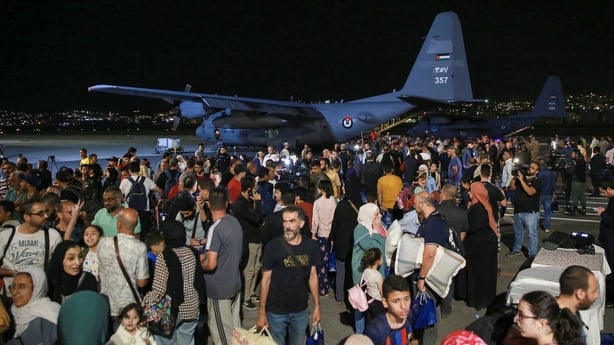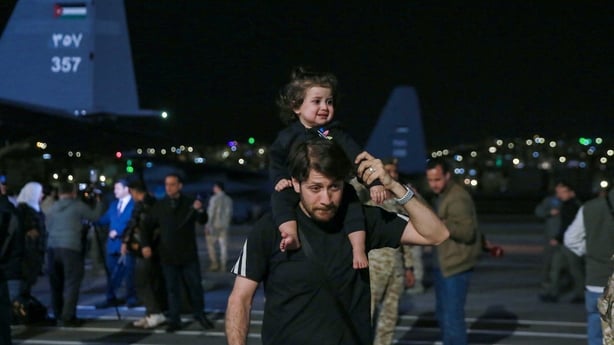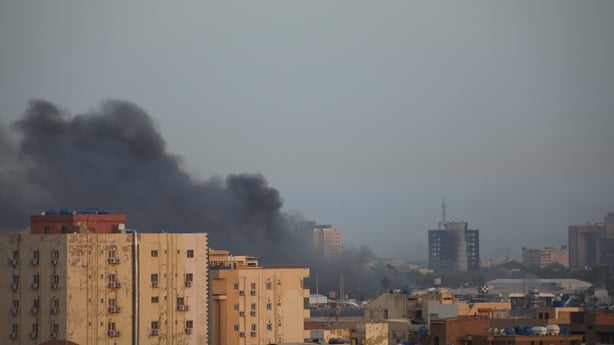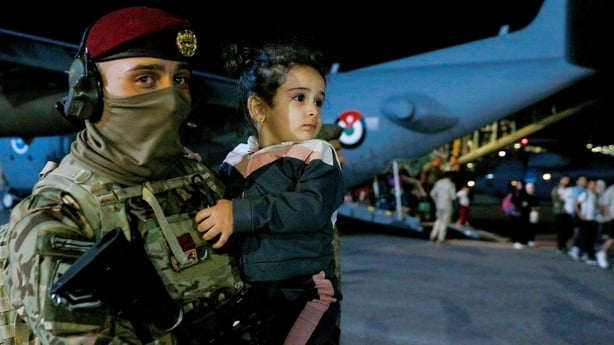The Department of Foreign Affairs has confirmed that a total of 50 people - Irish citizens and their family members - have been evacuated from Khartoum to Djibouti since yesterday, with the support of France and Spain.
The Government has also approved the deployment of an Emergency Civil Assistance Team (ECAT) to help with the evacuation of Irish citizens from Sudan.
The ECAT will be based in Djibouti, where the evacuation of EU citizens is being co-ordinated.

It is understood that the ECAT team includes experienced personnel from the Department of Foreign Affairs and four members of the Defence Forces' Army Ranger Wing.
Ireland has purchased two aircraft that will be able to be used in future extraction missions like the one in Sudan. They will be delivered in June and September.
Earlier, Independent TD Cathal Berry said that Ireland and Malta are the only countries not to have an airlift capacity.
A government spokesperson said that Ireland will still work on an EU basis, but that the two C295 maritime patrol aircraft to be delivered later this year are "capable of being configured in a strategic airlift transport role if required".
In addition, Airbus has been awarded a €68m contract to provide a new fixed wing military transport aircraft, which is expected to be delivered in 2025.
The Taoiseach yesterday said members of the mission will help with the evacuation of around 150 Irish people and their families from the region.
The duration of the mission is "dependent on the progress that can be made, the security situation on the ground and decisions by extraction partners".
The department said that "the security of the team, and of our citizens and their family members is paramount. Speculation by the media, or on social media, on the operational details is unhelpful".
Statement on situation in Sudan. pic.twitter.com/rPKBHR0bsW
— Micheál Martin (@MichealMartinTD) April 23, 2023
Officials in Dublin and Nairobi are continuing to support citizens and their families still in Sudan, and the advice for those remaining is to shelter in place and stay in contact with the embassy in Kenya.
It is understood around 100 citizens remain in Sudan. However, this figure does not include their dependents or family members, so the overall figure is expected to be higher.
The department also said that as it works to bring citizens and their families safely back to Ireland, 45 million Sudanese civilians remain there, and the fighting in Khartoum is rapidly causing a humanitarian catastrophe in addition to an already fragile humanitarian situation in Sudan, where 12 million people are suffering from acute food insecurity and millions dependent on humanitarian aid.
Around 50 Irish citizens have been evacuated from Sudan so far, Tánaiste and Minister for Foreign Affairs Micheál Martin has said | Read more: https://t.co/ueLMsLLtlp pic.twitter.com/70h9Cq5JYY
— RTÉ News (@rtenews) April 24, 2023
Earlier, Tánaiste and Minister for Foreign Affairs Micheál Martin thanked France and Spain for evacuating Irish citizens, saying they had done a "remarkable" job.
Speaking on RTÉ's Morning Ireland, Mr Martin said the situation in Sudan was fluid. He advised Irish citizens who are still in Sudan to follow the Irish embassy account in neighbouring Kenya on Twitter and to stay indoors and stay safe until further advised by the Irish team on the ground.
It will take some days, he warned.
The Tánaiste said that efforts will be made to support Irish families with Sudanese relatives.
This morning, Spain's government confirmed that Irish citizens were among 100 people evacuated from Sudan last night.
In a statement, the Spanish department of foreign affairs said military aircraft carrying evacuees left Sudan's captial Khartoum and landed in Djibouti.
The operation passed without incident.
A total of 30 Spanish citizens and 70 others from Europe and Latin America were flown out of the African nation.

The Department of Foreign Affairs said Irish citizens in Sudan are no longer being advised to travel to the French embassy because it has closed and is no longer a gathering place for evacuation.
The department said the change in advice was due to the rapidly changing situation on the ground.
Several other nations have also begun evacuating their citizens from Sudan, including the UK, France, Germany and the United States, some of them using Djibouti as an initial transit point.

The fighting between Sudan's army chief Abdel Fattah al-Burhan's forces and his former deputy Mohamed Hamdan Daglo's Rapid Support Forces (RSF) began on 15 April over a dispute on the planned integration of the RSF into the regular army.
The violence has left at least 420 dead and 3,700 injured, according to the World Health Organization.
We need your consent to load this rte-player contentWe use rte-player to manage extra content that can set cookies on your device and collect data about your activity. Please review their details and accept them to load the content.Manage Preferences
More than 1,000 European Union citizens were evacuated over the weekend, the bloc's foreign policy chief Josep Borrell said this morning.
"It has been a complex operation and it has been a successful operation," Mr Borrell said.
The French government said 388 people have so far been evacuated from Sudan as a result of French evacuation operations.
This morning, Sweden said that all its embassy staff in Khartoum, their families and an unspecified number of other Swedes had been evacuated to nearby Djibouti.

Sweden said military planes and personnel would continue to help in the evacuation of foreign nationals as long as the security situation allowed.
A German air force plane with 101 people evacuated from Sudan landed in Berlin this morning.
The Luftwaffe has flown out 311 people so far from an airfield near Khartoum, the German military said, and the first batch was brought back to Berlin today aboard an Airbus A321 from the Al Azrak base in Jordan, which is being used as a hub for the evacuation operation.
The German military did not provide a break-down of how many of those evacuated were German citizens or nationals from other countries.
Switzerland has closed its embassy in Khartoum and evacuated staff and their families over the security situation in Sudan, the Swiss foreign ministry said on Twitter.
British nationals trapped in Sudan have said they feel "abandoned" by the UK government as the Foreign Secretary warned that help will remain "severely limited" until a ceasefire is reached.
James Cleverly has faced questions about why British diplomats had been prioritised over other UK citizens following a night-time evacuation mission to rescue embassy staff from Sudan as internal warring rages on.
Some UK nationals stranded inside the country, who were advised to register their presence with the Foreign Office and shelter in place, were organising private evacuations as the prospect of help remained limited.
Mr Berry, who is a former member of the Defence Forces, said this morning that the lead element of the Irish Defence Forces team were due to land in Djibouti shortly.
This could be between two and four people, he said, and the main body will follow over the next couple of days.
Speaking on RTÉ's Morning Ireland, Mr Berry said the mission is very small and should really be three times that size.
There is limited capacity for a team of 12, he said, but added that they will provide medical support and communications.
"There'll be a couple of paramedics on the team. Also secure communications back to Dublin, that is the frequency-hopping encrypted radio sets, also liaison on the ground.
"Then there'll be an intervention element. So an intervention element could link up with a foreign helicopter for instance, or an aircraft and fly into Sudan, link up with Irish citizens on the ground and rescue them."
He described the situation in Sudan as very dangerous and unstable, adding: "It's heading for a full civil war."
Mr Berry said that Ireland and Malta are the only countries not to have an airlift capacity. This situation has been normalised here, he said, but it is absolutely not normal.
Meanwhile, Sinn Féin leader Mary Lou McDonald commended the efforts of the Defence Forces and the Department of Foreign Affairs.
"Obviously, the situation in Sudan is very violent, very dangerous, and it's imperative that we get our own citizens to safety.
"There has been an ongoing issue around investment in the Defence Forces, that has to be resolved because it's at moments like this that the vulnerability of not investing in our capacities, not investing historically in our Defence Forces, that it comes home to roost."
She added: "The job though is to get citizens to safety, and I wish everybody well in that endeavour."







